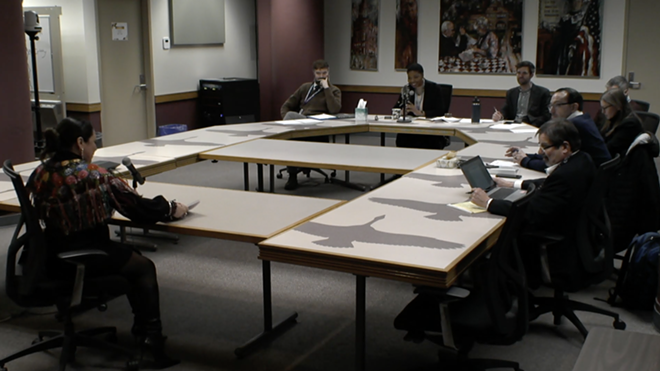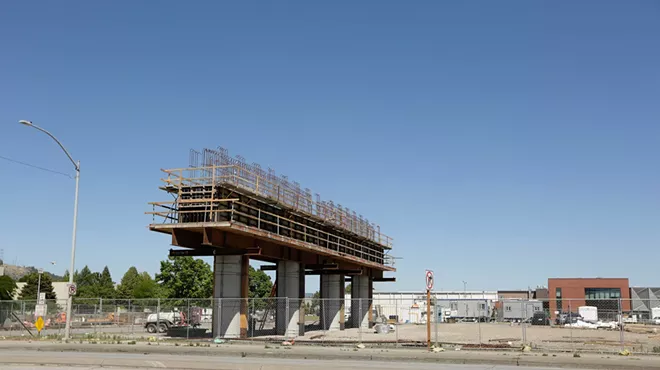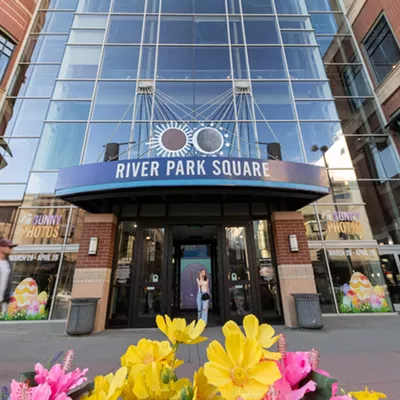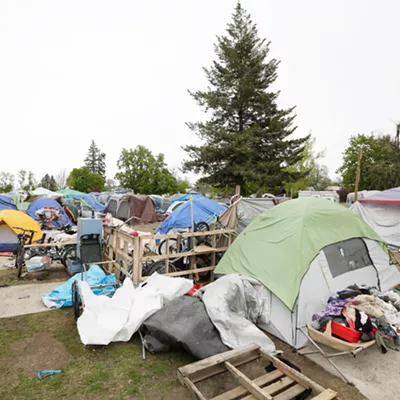
Lili Navarrete is Spokane's newest City Council member.
On Monday, City Council members appointed her to fill a seat representing south Spokane's District 2, which was vacated with Betsy Wilkerson's election to Council president in November. Navarrete will serve until the next city election in November 2025.
Navarrete currently works as a community development officer with the state Commission on Hispanic Affairs. She moved to Spokane from Mexico City in the late 1980s, and will make history as Spokane's first Latina and first immigrant to serve on the council.
Council member Paul Dillon, who previously worked with Navarrete at the local Planned Parenthood, says all the people who applied for the position were strong candidates. But he thinks Navarrete's thoughtful application material, work experience and widespread community support helped put her at the top. Progressive groups like Fuse Washington and several local labor organizations endorsed her bid for the vacant seat.
"It seemed like there was just a lot of consensus around her," Dillon says. "She got here on her own merits and I think really campaigned for the position. It was clear that she had the community support."
THE INTERVIEW
Seventeen people applied to fill the seat. Council members chose five finalists and interviewed them last week.
Each council member was allowed to choose one question, and most chose standard job interview-style questions: Why do you want this? What are you most excited to work on?
There were a few notable exceptions.
Dillon, who was elected in November to the other District 2 seat, asked applicants how they would handle development in the district's Latah Valley neighborhood, which has recently struggled with infrastructure not keeping up with growth.
The question asked by Council member Michael Cathcart — who represents northeast Spokane’s District 1 and is one of the council’s two-person conservative minority — was pointed.
His question (which was longer than everyone else's combined) mainly focused on asking applicants if they would commit to “geographic equity” and treating himself and Jonathan Bingle — the other District 1 representative and conservative member — with honesty, respect and fairness.
Cathcart says his question was prompted by the continued “mistreatment of District 1” by the council’s left-leaning majority, and that he was disappointed by most of the applicants' answers.
Cathcart and Bingle were the only council members to vote against appointing Navarrete on Monday. They both expressed frustration about the appointment process not being more open to the public. Cathcart thought there should have been a debate or town hall so people could learn more about the candidates.
It’s too late for such a debate now, but in the interest of transparency, here’s a recap of how Navarrete answered City Council members’ questions last week.
During her interview, Navarrete outlined her vision for a permanent homeless navigation center, a better community relationship with the police and a more diverse and inclusive city. Her answers have been lightly edited for length and clarity.
(Note: The applicants saw the questions before the interview and had time to prepare answers and bring notes.)
BETSY WILKERSON (CITY COUNCIL PRESIDENT): Why do you want this job? Do you understand the time commitment?
NAVARRETE: First of all, I want to thank you all for taking the time interviewing us. There’s a lot of talent out there, and a lot of amazing people. I also want to acknowledge the land that I’m on and remind myself that I’m still in stolen land.
I immigrated from Mexico City to Spokane with my parents in 1988. I grew up with the city. I grew up with its ups and downs, with the infrastructure, with the environment and, unfortunately, also with the discrimination that’s out there. But that never let me down. I actually take it as a strong force to continue representing my community. I have three children. I chose Spokane to be my home.
I am no stranger to working overtime. In my previous position, I ran a mobile clinic where I not only worked my full time job, and on the weekends, we went out to rural areas with a team of amazing folks. We probably worked around 50 to 60 hours. And on Monday, I still came to the office with a smile because I knew my community was being served.
I have the privilege of coming home to a warm plate and a roof where other people don’t. I also have the privilege of having healthcare, which some people I serve don’t.
To me, working overtime, having a full-time job, taking care of my three kids and my pets, it doesn’t scare me. I’m used to it. I’m a hard worker and I’ve shown it. And I think the people that are supporting me, all the organizations that have faith in me, have also seen all the work that I’ve done. I’m not scared.
PAUL DILLON (DISTRICT 2): The Latah neighborhood has grown over the last several years. How will you prioritize infrastructure projects and land use that respond to our housing crisis?
The Latah Valley, even though it’s a beautiful area, there’s a lot to be done.
There are two things I want to acknowledge with this question. First, I totally support a moratorium in the Latah Valley. We need to see infrastructure. We need to make sure that there are all the necessary safety things in place. Like streets, lighting, a firehouse, development to have people living there. Especially with the wildfires that we have been having every year — and are unfortunately getting worse because climate change is real.
Spokane is in a housing crisis as well. We do need more homes for people, we need to work with developers. We need to really think about how we’re going to make it sustainable, how we’re going to keep the community safe. We’re going to be responsible for the lives there.
ZACK ZAPPONE (DISTRICT 3): What are some policy proposals or priorities that you would want to work on?
I was really excited to see all the proposals that you all mentioned in the Spokesman article. One that I really like and think we can all cosign is our houseless crisis, which has, in my opinion, gotten a lot better in the last couple years. Our houseless community is being treated with dignity and respect. But now we need to step up and do navigation centers.
We use navigation centers in our immigrant community. What our navigators do is provide resources. They provide healthcare, they provide translation resources and culturally appropriate food and pretty much anything that they need to thrive. There’s no difference between, really, the immigrant population and our houseless population. We need to see them thrive also. By having a centralized navigation center, we can make them thrive.
We need one where they can access transportation, because a lot of them don’t drive. And we need a centralized one because we don’t want them to scatter in different districts. It needs to be central so they all can come and get the services, mental health as well as job resources.
We just need to be more accessible. We need to have the folks feel that they are welcomed and that we are there for them as a City Council, and as a city overall.
JONATHAN BINGLE (DISTRICT 1): Let’s say you are selected to be on this body. What is the issue or issues that you’re most excited to tackle?
There are two. Definitely the navigation center. And also, piggybacking on some of the people who are also interviewing, building bridges with law enforcement.
I am a commissioner for the Office of the Police Ombudsman. Part of the reason I joined was because I want to build the bridge of trust between my community and the police department. With that being said, there are a lot of times with my community when they’re in need of law enforcement but they don’t call because they’re afraid. Not only the language barrier, but also because they’re afraid that maybe ICE will be called on them, or something negative will happen to them or someone will be taken away due to not being able to hold a conversation.
I also want to see the police department work with the citizens. They need to do more outreach and gain that trust.
My son is going to be a police officer. I want the best as a mother and as a citizen. And I do expect him to work with the citizens and have that outreach and gain that trust.
KITTY KLITZKE (DISTRICT 3): This was my favorite question people would ask me when I was running for office: In a situation where a person or group isn’t supportive of a concept you are proposing, what strategies would you use to help them along?
The strategies that I found helpful — and, in my opinion, I’m really good at — are communication and compromise.
Growing up, a lot of people never agreed with me because of where I come from or my thoughts. But that’s okay. We’re not going to always see eye to eye. And that’s why I’ve learned to compromise and communicate.
I’m going to share a story: When my oldest son was graduating from high school, their school didn’t let them wear cultural regalia. And for us, for Latinos, representing something is very important. To graduate for BIPOC students is a big milestone. For me, it was very important for him to represent his culture.
When they said that he couldn’t wear his regalia, I asked for a meeting and I said, ‘These are the reasons why you should implement this. My son is not the only Latino here. There are other BIPOC students here and they want to wear their regalia. So let’s compromise. It’s for the best of all your students and it’ll also uplift where they’re coming from.’
A few days later, they did let my son and other students wear regalia. I got other organizations involved to go into that meeting from different cultures so they can see.
I mention this because Spokane City Council has a long history of achieving compromise, and I don’t want to lose that momentum. We’ll always possibly agree to disagree, but at the end of the day we’re working for our constituents and we have to agree at some point on something for the betterment of them.
MICHAEL CATHCART (DISTRICT 1): What sort of commitment are you willing to make today concerning geographic equity in your decision making process? Although not in your district, will you commit to taking the time to understand and collaborate with District 1 Council members during these two years to address the unique challenges and opportunities in Northeast Spokane — an area that has long been under-resourced, remains underrepresented by this Council, and one that has not experienced the same equitable investments over time? Lastly, do you believe the sitting representatives elected by District 1 constituents deserve to be treated honestly, fairly and with respect by the majority of this Council body?
Thank you for that question. That was a long question, and it made me reflect a lot.
I believe this is a council of equals. Myself experiencing inequality in a lot of spaces, I learned to navigate through them. I think what I would bring here is how to approach each and every one of you to learn how to work together. As equals, we should respect each other and work together for the betterment of Spokane.
I also believe we shouldn’t be using geography to decide how our constituents should be taken care of. I have lived in District 2 for 33 years and I’ve seen it grow. Our home was one that was bulldozed by the [Washington State Department of Transportation]. That was our very first home that we purchased when we came to the U.S.
As you all know, District 2 is a pretty diverse district. I kept being there because I just love the diversity, the community, walking to the local store that's a couple blocks from my house, seeing people speak different languages.
So I would do my best to work with you and Council member Bingle to build a bridge and work with your district. And what I love about District 1 as well is its immigrant and refugee population.
I like to think the reason I have the support of so many folks and organizations is because I prove that I’m a bridge builder between community. It just shows my ability to navigate and communicate and to be a better representative of folks that are not represented at the table.
A voice like mine has not been here. It hasn’t been heard. And I feel that, by having me here, I will represent a lot of folks that don’t want to come to City Council because they don’t feel welcome or because they might feel that their opinions don’t matter. I want to be the person that represents District 1, District 2, District 3, everyone. I’m not just going to be serving my district, I’m going to be serving all of Spokane.


























